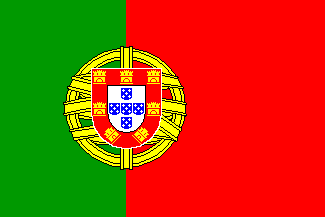|

Click here to listen to the Portuguese National Anthem Portugal is one of the oldest countries in the world. It's independency was achieved in 1143, after the Christian Reconquer of the Iberian Peninsula.
By the 14th century its borders were delined, giving the country the eldest borderline in Europe.
The 15th and 16th Centuries were the golden era for Portugal...
Having such a long coast on the Atlantic had its fruits for the Portuguese and it led to the establishmentof a country of fearless sailors and conquerors who made vast and important maritime discoveries.
Portuguese sailors reached places never gone before and contributed to the discovery and knowledge of the blue planet we all live in. Too contemporise it, the Portuguese were the "astronauts" of that time.
Achieving a position of World Power in those years, from then on the country and it's empire slowly lost importance.
In 1580 the country lost its Independence for the first and only time. A dead king in Marocco and no descendant for him led to the crowning of Filipe II of Spain. During the following 60 years the Iberian Peninsula was united.
On December 1st 1640 Portugal regained independence and expelled the Spanish rulers out of the country and their maritime colonies. Those 60 years were ruinous to the portuguese empire which saw many colonies being attacked and conquered by the english and the dutch.
October 5, 1910 marks the beginning of the Republic in Portugal.
Portugal was the last European Country to end it's Decolonization process, in 1974, following the Democratic Revolution that ended a 40 year Dictatorship.
Currently Portugal is one of the 15 Member-states of the European Union and in 2002 will along with 11 others join the European Currency.
Portugal is also a founding member of NATO (1949).
|
|
 |
 |
|  |
 |
 |
|

Portugal is located in the Westernmost point of Europe, bordering only one country, Spain (North and East). The other frontier is the Atlantic Ocean (West and South).
Asides from mainland Portugal, the contry also includes the Archipelagos of Azores and Madeira that lie 1500 km and 900 km from mainland, respectively.
The country has got a total area of just over 92000 km2 and according to the 2001 Population Census, a population of 10 314 082.
Its type of climate is the the mediterranean type, with relatively mild winters and warm to hot summers. The summer is the dry season. Precipitation occurs mainly in the winter and ranges from 500 mm/year in the south to around 2500 mm/year in some areas of the Northwest.
Portugal's main cities are Lisbon (the capital city) with a population of 550 000 (over 2 000 000 in the metro area) and Porto with a population of around 220 000 (over 1 500 000 in the metro area).
Its main activity sector is the tertiary... The agricultural importance slowly disapeared over time and more rapidly after the adesion to the European Union.
The country remains very rural though, with over 51% of the population living in areas considered rural.
Tourism has got an important contribution to the country's GDP. Agriculture still accounts for over 10% of the Work Force.
Portugal occupies the 28th position in the Human Development Report produced yearly by the United Nations, being one of the countries considered in the High Human Development Category. However, it is also the least developed country of the European Union.
|
|
|

